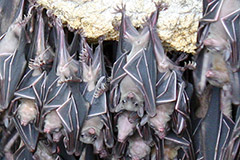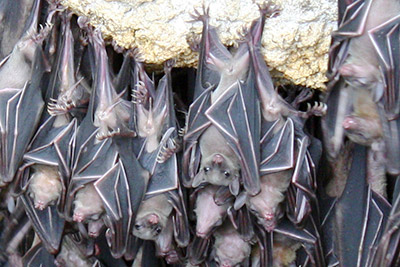Fruit Bats: Killer Or Victim?
|
Photo courtesy: Juliet Solar
|
On a beach on the island of Sibale, about 15 miles off the coast of Mindoro, when the glow of the departed sun is still lingering in the heavens, a large fruit bat may flap into the arms of the talisay tree that has given me shade throughout the day. It will climb in ungainly fashion along the limb of the tree towards a small clumps of fruits near the extremity. After maybe 30 minutes it will take flight and depart towards another stand of trees on the headland, about a mile distant, its darkened form a momentary obscurer across the star studded heavens. Could this be the killer? . . . the carrier of ebola virus that is currently causing untold panic and bizarre acts of civil and state sponsored violence, pitting neighbor against neighbor in West Africa?
No! The fruit bat is the victim . . .
Fruit bats are one of the reasons why so many of tropical islands and landmasses are (were) covered with the widest variety of trees: fruiting trees. Not all necessarily offering fruits palatable to humans it is true but the trees owe their existence, in so many places and in such abundance, to the fruit bats that have carried their seeds and dropped them on virgin land, each wrapped in its own individual package of fertilizer.
Some trees have evolved to employ fruit bats in another way too: offering fragrant flowers to guide the fruit bats to the fruit, the newest flowers cleverly blooming where the fruit bats feast so that they may be pollinated to enable the next season of bounty.
Fruit bats have been exploited by trees in these ways for millions of years forever pollinating and dispersing seeds, much farther and faster than the four winds could ever do. The fruit bat’s reward for its labors is a continuously replenished food supply.
Especially in a tropical paradise such the Philippines we exploit the fruit bat too. Few stop to think as to the source of the abundant fruits in the market every day. Many assume they are the work of a farmer’s toil, some the work of a profit hungry importer. While it is true that these fruits may be picked & packaged, and distributed by Man, the reason there is such variety and such abundance is directly due to the fruit bats’ foraging in the trees after sundown. For without the bats the flowers would not be pollinated and the fruits would never appear.
If you doubt this, travel to Davao and sit on a beach on the west coast of Samal Island at sundown and watch the two million or more fruit bats head out from the Montfort Bat Cave every evening, they literally blacken the sky with their numbers. Then visit any market, in any village or town, around the Davao Region and feast your eyes on the piles of pomelo, durian, rambutan and jack fruit, and so many more fruits that are there for one simple reason: the nightly toil of the bats.
So, I can hear you ask, how are the bats the victims?
The fruit bats are victims because Man is ignorant and this, combined with his greed, leads him to acts of incredible stupidity.
Stupid Act 1: harvesting bat guano. Bats, and fruit bats in particular, roost in caves. They poop in caves. A cave that has been home to bats for a hundred years probably has a foot or more of rich guano fertilizer covering the cave floor. Man thinks: “free fertilizer”, and goes into the cave by day, with flashlights, smoke and noise, to harvest the guano for his own selfish ends. Daytime is bat sleeping time. The bats are disturbed and eventually fly off to find a place where Man is not present . . . farther away from the fruit trees that are feeding Man. Once the guano is gone it may take another century before the bats return to the cave and start to pollinate the tress in the vicinity. Result: Man has to travel farther for his fruit and waste more energy than it would have taken to compost his own waste vegetation for the same quality of fertilizer that he greedily extracted from the cave. The ignorance in this is obvious: how many guano harvesters even considered that, if you want to harvest the guano do it at night while the bats are out and about pollinating the fruit trees, so that they can come home and sleep all day without disturbance. How many? None.
Stupid Act 2: bats can be cooked and eaten. Man is always out for an easy life. A fruit bat is a large meaty animal that flies slowly and congregates (in caves or in trees), during the day while it tries to sleep, i.e. easy to catch. As in Stupid Act 1. if we disturb the fruit bats while they are trying to sleep they will find another location to roost, father away from Man. The additional ignorance here is less obvious but: because bats in general, like Man himself, are carriers of viruses and bacteria, catching and preparing a fruit bat for consumption brings Man into direct contract with bat-friendly viruses and bacteria.
Many viruses and bacteria in the wild are beneficial – ask any pharmaceutical company where they steal their potions from – some are benign, but a few can be harmful. In West Africa, one such harmful virus is ebola.
The ebola virus is harmful to Man but not to fruit bats. Individual fruit bats may be carriers of ebola virus and its presence is apparently completely benign to them. But, if Man comes into contact with an ebola carrier fruit bat while preparing the meat for cooking, cross infection may occur – more than 50% of cases of ebola infection are fatal.
We should be thankful that the Philippines is almost the other side of the World from West Africa, so ebola will never be a problem here . . . without Man’s help / stupidity of course.
Back in Metro Manila, last week the subject of ebola came up in conversation in a local bar – a fantastic place to observe ignorance, especially after 9pm. Yet a third Stupid Act was suggested – let’s kill the fruit bats then there will be no ebola.
My thought was: let’s remove Man from the equation then there will be no need to kill the bats and the tress can carry on fruiting for another eon or two.
Sadly, slowly, Man is already removing himself from the equation and soon the “victims” will be free to pollinate, poop & procreate, and restore our tiny blue jewel in the Cosmos to its former glorious luster. I think, maybe soon there will be only one safe place left . . .
I must go back to the island of Sibale, and sit on the beach, under the talisay tree, at sundown. The fruit bats won’t mind and I will be able enjoy the fruits of their labor



 Fruit bats preparing for a night in the forest
Fruit bats preparing for a night in the forest